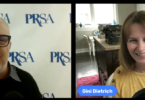Who could forget Tom Cruise’s notorious response to Today show host Matt Lauer, when Lauer asked Cruise whether nor not he had considered the possibility that the attention deficit hyperactivity disorder (ADHD) drug Ritalin — the use of which Cruise opposes — might actually work for some people.
Well, Lauer was again at his glib best Tuesday (Nov. 1) in an interview with Starbucks CEO Howard Schultz. The producers of Today invited Mr. Schultz on air to discuss the launch of a program through which Starbucks, with the Opportunity Finance Network® (OFN), is accepting donations for the Create Jobs for USA Fund in every U.S.-based, company-operated Starbucks.
According to the Starbucks news release, the program works like this: Donations to the Fund, which has been seeded with a $5 million contribution from the Starbucks Foundation, will help create and sustain jobs in underserved communities throughout the United States. The Fund, managed by OFN, will pool donations from Starbucks customers, employees and others. Donors who contribute $5 or more receive a red, white and blue wristband emblazoned with the message “Indivisible.”
First, Lauer (claiming to represent the “cynicism” bred by “tough times”), asked if this wasn’t just some evil scheme to sell more pumpkin-spice lattes. “The guy [Schultz] wants to do good, he wants to create jobs,” Lauer began. “But one of the other reasons behind this is because, if you don’t have a job, you can’t afford a $4 cup of coffee.”
Schultz, to his credit, didn’t take the bait. “I can assure you,” he replied, “this is nothing about marketing. This is our responsibility as a company, and recognizing that we as business leaders should not and cannot wait for Washington … businesses and business leaders have to do more.”
So, if it’s not about selling more coffee, Lauer reasoned, then it must be about generating positive press. “You say it’s not about PR,” Lauer moaned, “but it sounds a little like a PR campaign.”
Schultz again showed himself to be a skilled communicator with the keen ability to stay on message. “Not about PR,” he said, “It’s about Starbucks using its scale for good … about a problem in America and the fact that business and business leaders have to step up. We can’t wait for Washington. This is about leadership.”
The problem with Lauer’s glib characterization of the Starbucks initiative as some sort of public relations “ploy” was elucidated brilliantly by Karen S. Miller in her article, “Public Relations in Film and Fiction,” which originally appeared in the Journal of Public Relations Research.
“The problem with an inadequate discussion of the work of PR is … that the audience is left with two opposing and equally deficient views,” said Miller. “Sometimes, PR is magic, which only a magician with secret knowledge can perform, while audience members wonder how they have been tricked. In other sources, it is almost embarrassingly easy — a phone call or a cocktail with a reporter is all it takes. Neither view explains the PR process, and because strategies and tactics are unexplored, practitioners’ effectiveness seems ominous.”
Beyond that, Lauer’s tone was dismissive and pejorative toward an entire profession, and discourteous toward a guest the producers invited into the homes of millions of viewers. I wonder if Lauer engages his own public relations professionals and, if so, what they would think.
What do you think?
Arthur Yann, APR, is PRSA’s vice president, public relations.
Visit msnbc.com for breaking news, world news, and news about the economy







First, I’ve always liked Matt Lauer. Out of all the morning hosts, he has the most to offer. Good interviewer, can handle bad and good news (and even the ridiculous).
In this case though, after watching the interview with Schultz, I found him very dismissive of a program that can do some good. Why does everything that is good have to be a PR ploy? Sure, Starbucks will get a ton of positive media coverage, but instead of focusing on the good, Lauer came back with skepticism.
Let’s be honest, Matt Lauer probably doesn’t really know what PR is all about. He’s got someone in the NBC corporate office to help with his own.
Arthur,
Interesting article. I suspect that what drives Lauer to conduct an interview like that has more to
do with ratings rather than a journalistic motive to get an accurate and well-rounded story through his interviews. Journalists love conflict in a story – especially when their the ones creating it. Matt’s more interested in ratings, and he’s just using the poor guy from Starbucks to create good TV. It amazes me how many corporate folks agree to do interviews with shows like 60 Minutes. Do they and their PR folks not understand that for these types of TV reporters, it’s just a game to create controversy and get ratings?
I’ve often heard it said that it is better to cooperate with the media so that you have some control
over the message. Many media relations experts say, “no comment” is a bad idea. I couldn’t disagree more when it come to folks like Lauer and 60 Minutes.
Alex
(Edited by moderator to fix formatting issues.)
Alex/Jason, thanks for dropping by to offer your thoughts.
I think Alex is absolutely correct about the ratings bit. Though, to Jason’s point, I also think too many journalists have no idea what goes into a successful public relations campaign. Perhaps they know what their publicists do for them, and view it through that overly simplistic prism.
I have a similar issue with journalists who characterize operational mismanagement or industrial accidents as public relations “nightmares.” This, to me, is a “public relations nightmare”: http://gothamist.com/2005/06/22/huge_popsicle_melts_on_a_hot_summer_day.php
Thanks again for taking the time to read and comment on this post.
I think Matt Lauer is like most media types–educated but not very bright. I get sick of the media turning positives into negatives and focusing on the negative 100% of the time.
This is really sad that in our society we have to look for the bad to draw viewers in. We should be cheering on companies that offer these types of programs. Sure, the company will get some positive press, but it is a complete win-win situation. Why do we allow our media to become so saturated with the concept that we must use conflict to feed viewers? We should be celebrating the successses of others and then media should be our corporate watchdogs when behavior is corrupt (which here is clearly NOT the case). Thank you for bringing this to our attention.
Honestly, I do commend Starbucks for their program, and I’m sure it’s not all about PR, but let’s face it–Starbucks is getting good PR from this. Starbucks is a huge corporation, and didn’t get to its current size by being “charitable” or “playing nice.” I’m sure there are great intentions behind all this, but does anyone honestly think Starbucks would implement this same program if they were at risk for a loss of capital? Of course not. Now, I’m not trying to pass judgement on PR and American Capitalism, I’m simply saying that PR gets a bad rap because of the constant disingenuous actions of corporations like Starbucks not admitting that campaigns like this won’t help their image, and in the long run, help make more profits. It’s not about magic or cocktails; it’s about a real skepticism most Americans have towards the “bridge” between a corporation and the publics, especially when that “bridge” is a paid extension of that corporation. Maybe, if companies the size of Starbucks were more honest about the money and PR they stand to gain through these sorts of campaigns, people would be more willing to appreciate their benefits from said campaigns. I think this country(especially in a recession), by-and-large, sees how lucid and disingenuous corporate “goodwill” really is and they want a more honest and open connection with the companies. It isn’t “Hollywood” or some vague “clan” of people who portray PR practitioners as disingenuous, it’s the American population.
[…] on the PRSAY blog, Arthur Yann threw Tom Cruise’s words at Lauer, accusing the morning show host of being […]
Of course Starbucks running a program designed to help people in need will generate media coverage. The folks at Starbucks know that and hope it will garner positive media coverage, but that doesn’t diminish the value of the help the program may provide. The Today Show as devolved into another entertainment program that offers very little substantive news to its audience. The hosts of that NBC program now gush over celebrities and hammer on business people. It’s embarrassing to watch Lauer and his co-hosts gush over “celebrities” such as Kim Kardashian, but then be dismissive of people who actually have something of substance to say. I don’t recall ever seeing Lauer be abrasive or dismissive of a “starlet” or some B-list celeb who’s on the program as a result of some PR pitch. Where have all the good journalists gone?
I agree with KL Sullivan. Yes, actually, Starbucks’ program IS a PR program. It’s a great PR program. I think the problem with the portrayal of PR in media today is that “PR” itself has become a dirty word, a pejorative — as in, “Oh, that’s just a PR stunt.”
Those of us who are proud of our PR skills should stand up and trumpet our successes on behalf of our clients/employers. Show that pride in what we do. This is a win-win for Starbucks, its customers and the people who benefit, and that’s a fundamental benefit of good PR.
I find this article “discourteous.” Mr. Lauer was doing his job as a journalist, asking questions rather than just giving Starbucks free publicity for what is clearly a public relations campaign. It seems to be a well-devised and potentially impactful campaign, but a campaign nonetheless.
Fair point, Rita. Thanks for dropping in to express it.
It’s a brilliant marketing strategy that is a win for both sides. Starbucks does good for business folks, who are the very people who made them successful. I call that giving back. Where are the banks, the car companies and the financial houses that got the goverment bailouts? Sure, much of this has been repaid but don’t they have an obligation to extend a helping hand as they received help? Bravo to Starbucks for trying to help. $5 million is not small change. This program should receive publicity in the hope that other corporations can step up and offer a helping hand instead of being consumed by their bottom line.
Another good point. $5 million is quite a lot to spend on “just PR.” How many times have we had clients who’ve wanted to do similar things, but put a lot less money behind it?
There is also research that shows that men are more skeptical of cause-related marketinig and CSR programs than women. Perhaps some of that gender bias is coming through in Matt’s line of questioning? It makes me wonder if Anne had done this interview if her line of questioning may have been different.
Regardless, Matt Lauer was doing his job as a journalist asking what he did. Howard did a great job handling his interview and communicating what he wanted to communicate (cheers for Edelman trainers, perhaps?).
As a business person who stops by Starbucks on the way into the office, I commend Starbucks for their leadership. We need to fix problems in this country. Three cheers to anyone doing something positive and forward-thinking to work towards solutions.
Dawn — very interesting point regarding gender bias. I’d not considered that. Smart. Curious: since people have said this is just a way of increasing product sales, would this campaign get you into the store to buy a bracelet, if you weren’t already a regular?
At its best, public relations is about reconciling an organization’s interests with those of the public. In that sense, this is a public relations campaign, a very worthwhile one. But quite frankly I think as a profession we fret a little too much about how we are perceived. Yes, we work in PR, so naturally we are consumed with our reputations. But as a professional, the best way to promote ourselves is to do good, ethical work, and encourage those we counsel to behave ethically, and make sound decisions — not lament that the guy on a softball news program doesn’t like us.
Jonathan, thanks for your comment. Just to play devil’s advocate … based on this definition, Starbuck’s introduction of a new coffee drink could be considered public relations, right? It reconciles Starbuck’s interests (product sales) with the public’s (tasty new treats to enjoy as part of their daily routine or as a special indulgence).
It just seems to me that it’s a bit lazy and unnecessarily pejorative to dismiss this as just being some sort of PR stunt. As all of us who work in public relations know, there’s a lot more that goes into a public relations campaign than creating a bracelet to sell for a worthy cause. In fact, raise your hand if someone has come up with that idea one of your brainstorms …
Granted, it may generate product sales and it may engender corporate goodwill, but any number of things that a company does can accomplish those goals. Labeling all of them as PR undermines the specific strategic value we provide. And, like a lot of folks in public relations today, I am concerned with how we’re perceived, but I do agree with you as to how we can promote ourselves effectively.
Thanks again for dropping by to offer your thoughts.
[…] Posted by Arthur Yann in November 2nd 2011, at http://prsay.prsa.org/index.php/2011/11/02/matt-lauer-derisive-view-of-public-relations/ […]
[…] Matt Lauer’s Glib Response to Starbucks’ Jobs Program | PRSAY – What Do You Have to Sa…. LD_AddCustomAttr("AdOpt", "1"); LD_AddCustomAttr("Origin", "other"); LD_AddCustomAttr("theme_bg", "ffffff"); LD_AddCustomAttr("theme_border", "fbdddf"); LD_AddCustomAttr("theme_text", "7a7a7a"); LD_AddCustomAttr("theme_link", "f3686d"); LD_AddCustomAttr("theme_url", "fbdddf"); LD_AddCustomAttr("LangId", "1"); LD_AddCustomAttr("Autotag", "television"); LD_AddCustomAttr("Tag", "professional"); LD_AddCustomAttr("Tag", "random"); LD_AddCustomAttr("Tag", "current-events"); LD_AddCustomAttr("Tag", "media-relations"); LD_AddCustomAttr("Tag", "prsa"); LD_AddSlot("wpcom_below_post"); LD_GetBids(); Share this:TwitterFacebookLinkedInPrintEmailLike this:LikeBe the first to like this post. […]
First of
all, this initiative simply cannot be separated from Starbuck’s PR or marketing
campaign. The intent of whether or not
this campaign was designed to produce a positive press for Starbucks, or
increase sales of their drinks will never be known. However, it is clear that
no matter if they meant to or not, there will be an impact on their press
coverage and probably the sales of their beverages. Whether or not this was the
purpose or simply an after-effect of the community initiative is unclear.
Does it
matter though?
Let’s say that Lauer was right and it was a
marketing strategy for Starbucks.
Would it be ‘an
evil scheme’ to sell more lattes; if was actually helping people in the
process? Is it not considered a good
deed if the doer benefits from it?
If Starbucks
wants to use their name in the media to help underserved communities-
great. If this makes them gain positive
press- good, it should. Starbucks could focus
their efforts on other marketing initiatives or engage in PR campaigns that
wouldn’t have these positive outcomes.
I also agree that they will hopefully serve as
an example to other companies to give back to their communities. It wouldn’t be the worst thing in the world
if this program designed to help others, made other companies feel obligated to
design some of their own.
What really
matters, is the people who are going to be helped.
I
congratulate Starbucks for being able to incorporate a way to help others
through their business model (Even if it was not an intentional marketing
strategy as Schultz’s claimed). This has the opportunity to be very effective. Starbucks customers are engaged, identify
strongly with the brand, and are willing to spend $4 a day on coffee. They
would likely be willing to donate a few dollars to support a brand that they are
so involved with.
Matt Lauer wasn’t glib, IMHO. He was just presenting the cynic’s view point, so Howard Schultz could present the leadership position to dissuade those opinions. (He also presented the positives, first and foremost.) And, I’m a PR pro. I believe this was handled really well. Would we have preferred a sappy interview? If that had happened, off would have gone the cynics; meanwhile, they’d look absurd if they did that now, after this interview. Remember, an objection is just a request for more information.